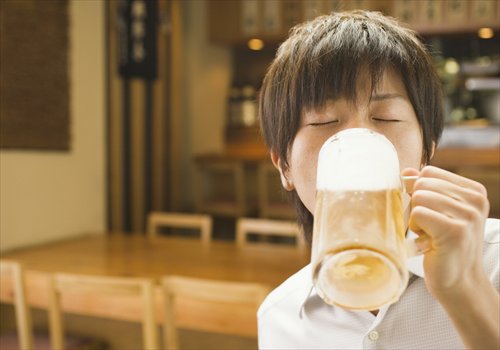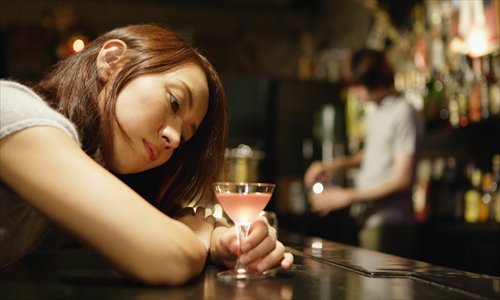Teen booze binge
Chinese youths get drunk to blow off steam

The most common triggers of teenage drinking are relationship problems and the inability to deal with painful emotions. Photo: IC
The day after taking his gaokao, 17-year-old Fu Ruoyu got horribly drunk. For him and his friends, it was a way of release. After taking their national college entrance examinations, the 30 teenagers gathered at a restaurant to have their "last dinner" together. But they also drank so much, Fu had to hold back from throwing up, for fear of appearing weak in front of his friends.
The teenagers drank more than six dozen beers and four bottles of white spirits, as they celebrated their freedom from high school and the pressures of study.
For them, drinking copious amounts of alcohol meant behaving like an adult. Fu drank at least five bottles of beer and three glasses of spirits. He found it hard not to throw up, but seeing all his classmates still happily drinking, he pressed on.
Fu said only by getting drunk, could his classmates express their true feelings.
"Drinking allowed us to vent - express happiness, sadness and our feelings for one another that we suppressed all these years, also our reluctance to part ways," said Fu.
But this is not the first time Fu overindulged on alcohol. When he was only 14, he and his junior school classmates had a similar dinner with wild drinking.
Fu believes graduation is the time to hang out with friends in restaurants and at a KTV club, and to drink alcohol.
"Students from the whole junior high school were all drinking, and no one found it inappropriate," said Fu. "And now as high school students, we are even more OK with drinking, since we are not children anymore. We are almost 18, adults."
The behavior of Fu and his classmates is not unusual for Chinese teenagers.
According to research done in 2013 and 2014 by the Chinese Center for Disease Control and Prevention (CDC), teenagers have a serious drinking problem. The prevalence rate among school students above 12 is as much as 51 percent. In the US, that rate is 66.2 percent.
The research included more than 30,000 teenagers from six cities - Beijing, Shanghai, Guangzhou in Guangdong Province, Chengdu in Sichuan Province, Jinan in Shandong Province, and Harbin in Heilongjiang Province. It also found that 28 percent of teenagers who drink, had their first sip of alcohol before they reached the age of 10. Most teenagers started drinking between 15 and 18. Sixty-two percent said they mostly drank at gatherings with friends.
China does not prohibit teenagers from drinking, but alcohol is not allowed to be sold to children under the age of 18 - a law not strictly enforced.
Psychologist Deng Jun, who specializes in teen psychology and behavior at the Second Hospital of Beijing, said that drinking is only a superficial phenomenon and a way of dealing with the troubles of teen development.
"Chinese teenagers' eagerness to explore the world is increasing, and they want to become independent as soon as possible," said Deng.
Dealing with emotional turmoil
For Fu and his peers, drinking is a very common way to let out repressed emotions.
"In junior high school our parents were strict with us so we did not have the chance [to drink] and after I entered senior high school, it was different," he said.
Relationship problems were the most common trigger for their drinking. Fu said he used to accompany two of his friends who drank.
One of the boys was dumped by his girlfriend, and the other was rejected by a girl he had always liked, when he told her his true feelings.
"They wanted to get drunk and forgot the painful feelings, just like on TV," said Fu.
"Almost everyone has emotions about love. It's not possible for one not to have someone in your heart."
Fu has been secretly in love with a girl, who already has a boyfriend, for some time. That's why he got blind drunk after his graduation. He was trying to pluck up the courage to tell her how he felt. "However, I failed to tell her what I was feeling," said Fu.
"I just did not dare to, and even after I downed one drink after another, I still didn't pluck up enough courage."
According to Deng, Chinese teenagers are going through puberty earlier and earlier. The generation born after 2000 are entering puberty at 10, and girls even earlier than boys.
"Although the desire for the attention of the opposite sex and crushes are normal, teenagers don't know how to handle relationships and rejection is common," said Deng.
"These early relationship failures cause pain, and they don't know how to deal with it."
Deng said feelings related to love and sex are becoming more painful for Chinese teenagers to deal with than the pressure of low academic grades and the inferiority of belonging to a disadvantaged family.
"They turn to an adult way of relieving anxiety and sadness," said Deng.

Teenage drinking can be related to rebellion, the need for independence and eagerness to enter an adult's world. Photo: IC
Influences from the West
The CDC research revealed that although the prevalence rate of drinking among Chinese teenagers is not the highest in the world, it has the potential to increase.
In Europe it's over 90 percent, while in Japan and South Korea it's over 60 percent. So are Chinese youths being influenced by their foreign, especially Western, peers?
Fu is good at computer technology. He has both a Twitter and a Facebook account, and is also connected to Steam, a platform on which video gamers play against each other. It presents him with ample opportunity to interact with foreign peers.
Fu met a 17-year-old Russian girl named Liliya on Steam, while playing Left 4 Dead, a shooting game. While video chatting on Skype, Liliya even showed Fu her father's gun.
After she moved to the US a few years ago, she found life quite quiet and boring, so she stole her father's alcohol and secretly had parties with her friends in a basement at one of their homes.
"They drink for fun, while we drink to relieve our sadness. I think that is the difference. It's not on the same level," joked Fu.
Drinking under the age of 21, is prohibited in the US, even though a person is deemed an adult at 18 and capable of making all other legal decisions.
Liliya said she envied Fu and his friends who can drink openly in Chinese restaurants.
Alicia Clark, a licensed clinical psychologist based in Washington, DC, said drinking among teens symbolizes rebellion, independence and an eagerness to enter the world of adults, and Chinese teens are no exception.
"Being able to drink legally is often perceived as a right of passage to becoming an adult," she said.
Clark believes that Western culture that "still glorifies alcohol use as a way to have fun, and be socially accepted" contributes to Chinese teens' desire to want to drink alcohol.
"[Drinking] is also a social pastime that is often depicted in popular media. Teens today are less sheltered, and exposed to global culture in an unprecedented way," said Clark.
Responsible parenting
Since many teenagers drink at home, experts said parents of teenagers have an important role to play.
"Parents' attitudes are very important. Parent empathy and understanding with regards to the difficulties of adolescence can help teens feel supported and thereby less needful of seeking excessive peer approval," said Clark.
"Traditional Asian values of responsibility, family pride and modesty can help protect a teen from overly impulsive or destructive behavior," she added.
Deng suggested that parents should watch their own behavior since children look up to them the most before puberty.
"If parents drink for fun or use it as a way to vent repressed emotions, children will learn the same habits, " warned Deng.
She said Chinese parents are constantly pushing their children to achieve more, which may trigger greater pressure on teenagers.
Deng advises Chinese parents to communicate more with their children to better understand what they are going through as teenagers.
"Parents should be able to detect when their children are troubled, and guide them before they turn to alcohol," she said.